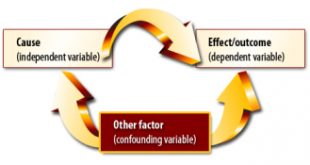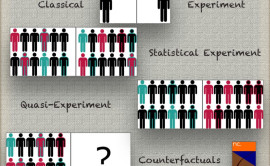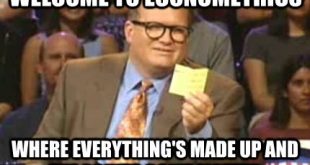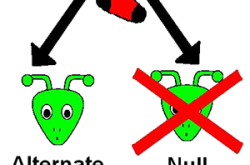The problems we face when using instrumental variables (student stuff) .[embedded content]
Read More »Instrumentalvariabler och heterogenitet
Användandet av instrumentalvariabler används numera flitigt bland ekonomer och andra samhällsforskare. Inte minst när man vill försöka gå bakom statistikens ‘korrelationer’ och också säga något om ‘kausalitet.’ Tyvärr brister det ofta rejält i tolkningen av de resultat man får med hjälp av den vanligaste metoden som används för detta syfte — statistisk regressionsanalys. Ett exempel från skolområdet belyser detta väl. Ibland hävdas det bland skoldebattörer och politiker att...
Read More »Introduction to instrumental variables
Introduction to instrumental variables .[embedded content] Great presentation, but maybe Angrist should also have pointed out the mistake many economists do when they use instrumental variables analysis and think that their basic identification assumption is empirically testable. It is not. And just swapping an assumption of residuals being uncorrelated with the independent variables with the assumption that the same residuals are uncorrelated with an...
Read More »Which causal inference method is the best one?
Which causal inference method is the best one? .[embedded content]
Read More »Graphical causal models and collider bias
Graphical causal models and collider bias Why would two independent variables suddenly become dependent when we condition on their common effect? To answer this question, we return again to the definition of conditioning as filtering by the value of the conditioning variable. When we condition on Z, we limit our comparisons to cases in which Z takes the same value. But remember that Z depends, for its value, on X and Y. So, when comparing cases where Z...
Read More »Econometrics — science based on whimsical assumptions
Econometrics — science based on whimsical assumptions It is often said that the error term in a regression equation represents the effect of the variables that were omitted from the equation. This is unsatisfactory … There is no easy way out of the difficulty. The conventional interpretation for error terms needs to be reconsidered. At a minimum, something like this would need to be said: The error term represents the combined effect of the omitted...
Read More »A tragedy of statistical theory
A tragedy of statistical theory Methodologists (including myself) can at times exhibit poor judgment about which of their new discoveries, distinctions, and methods are of practical importance, and which are charitably described as ‘academic’ … Weighing the costs and benefits of proposed formalizations is crucial for allocating scarce resources for research and teaching, and can depend heavily on the application … Much benefit can accrue from thinking a...
Read More »Econometrics — formal modelling that has failed miserably
Econometrics — formal modelling that has failed miserably An ongoing concern is that excessive focus on formal modeling and statistics can lead to neglect of practical issues and to overconfidence in formal results … Analysis interpretation depends on contextual judgments about how reality is to be mapped onto the model, and how the formal analysis results are to be mapped back into reality. But overconfidence in formal outputs is only to be expected when...
Read More »The biggest problem in science
The biggest problem in science In 2016, Vox sent out a survey to more than 200 scientists, asking, “If you could change one thing about how science works today, what would it be and why?” One of the clear themes in the responses: The institutions of science need to get better at rewarding failure. One young scientist told us, “I feel torn between asking questions that I know will lead to statistical significance and asking questions that matter.” The...
Read More »Statistical power (student stuff)
Statistical power (student stuff) .[embedded content]
Read More » Heterodox
Heterodox






